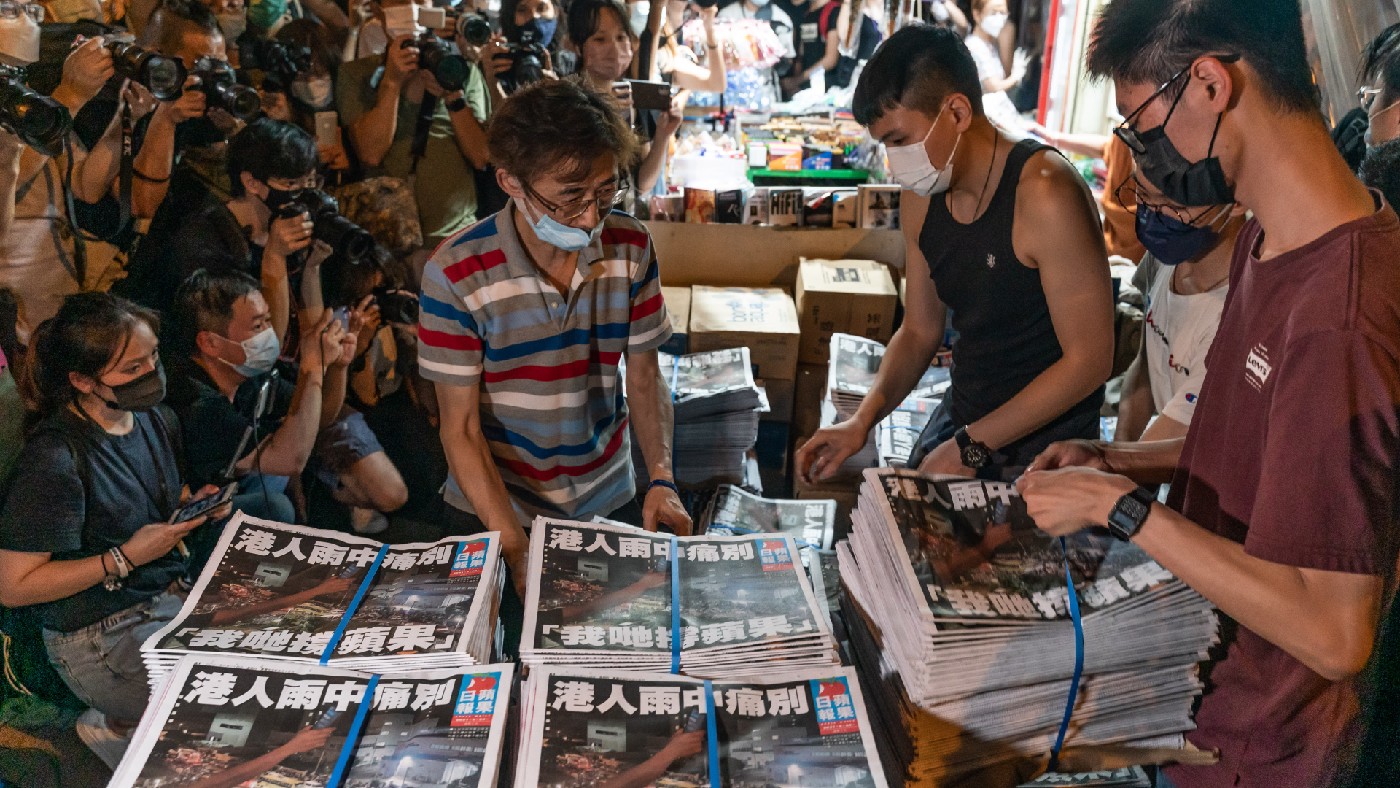The end of free speech? Hong Kong loses its Apple
The lively, pro-democracy Apple Daily tabloid is the latest victim of the harsh ‘national security’ law imposed on the territory by Beijing

A free daily email with the biggest news stories of the day – and the best features from TheWeek.com
You are now subscribed
Your newsletter sign-up was successful
The queues began forming soon after midnight last Thursday, said Eryk Bagshaw in The Sydney Morning Herald. Hong Kong’s Apple Daily newspaper had printed a million editions – “ten times what it would normally sell in a day” – but customers were desperate to “get their hands on a copy” as soon as they could; most newsagents sold out before lunch.
Why? Because the next day, this lively, pro-democracy tabloid, which had been at the centre of Hong Kong life for 26 years, was ceasing publication for good, the latest victim of the harsh “national security” law imposed on the territory by Beijing last year.
Seven executives and editors, including billionaire founder Jimmy Lai, had already been arrested under the law; the paper’s newsroom had been raided twice in a year, and its assets had been frozen. So, fearing for the safety of staff, owner Next Digital made the call to shut Apple Daily for good – another devastating blow to free speech in Hong Kong.
The Week
Escape your echo chamber. Get the facts behind the news, plus analysis from multiple perspectives.

Sign up for The Week's Free Newsletters
From our morning news briefing to a weekly Good News Newsletter, get the best of The Week delivered directly to your inbox.
From our morning news briefing to a weekly Good News Newsletter, get the best of The Week delivered directly to your inbox.
The story of Apple Daily – named after the forbidden fruit in the Garden of Eden – begins with Lai, said Ng Kang-chung and Chris Lau in the South China Morning Post (Hong Kong). His was a genuine “rags-to-riches” story. Smuggled from the mainland to Hong Kong on a fishing boat aged 12, he rose from the factory floor to set up clothing brand Giordano, and sold pro-democracy T-shirts after the Tiananmen Square massacre of 1989.
Six years later, he launched Apple Daily, a colourful tabloid that left its rivals trailing, said Xie Zifeng in Duanchuanmei (Hong Kong). At first, it was known for its raucous reporting and celebrity news; later, it became indelibly linked to 2019’s democracy protests. Lai, 72, was repeatedly attacked by Chinese state media; now, he’s paying for his beliefs with a 14-month jail term.
And rightly so, said state-owned CGTN.com (Beijing). His newspaper – “the poison Apple” – constantly undermined Beijing, and even called for sanctions to be imposed on China. Its editorial line has been nothing short of “treasonous”; its closure is “a warning to those who foolishly think they can mask sedition under freedom of the press”.
Apple Daily’s fate shows the extent to which the national security law has “redrawn the landscape” in Hong Kong, said Nikkei Asia (Tokyo). The territory’s media is now self-censoring to avoid a similar fate. But China will find its crackdown comes at a cost. With its freedoms eroded, “Hong Kong stands to lose its competitiveness as an international business hub” – and the “global pushback” against Beijing will continue.
A free daily email with the biggest news stories of the day – and the best features from TheWeek.com
-
 Local elections 2026: where are they and who is expected to win?
Local elections 2026: where are they and who is expected to win?The Explainer Labour is braced for heavy losses and U-turn on postponing some council elections hasn’t helped the party’s prospects
-
 6 of the world’s most accessible destinations
6 of the world’s most accessible destinationsThe Week Recommends Experience all of Berlin, Singapore and Sydney
-
 How the FCC’s ‘equal time’ rule works
How the FCC’s ‘equal time’ rule worksIn the Spotlight The law is at the heart of the Colbert-CBS conflict
-
 Corruption: The spy sheikh and the president
Corruption: The spy sheikh and the presidentFeature Trump is at the center of another scandal
-
 Putin’s shadow war
Putin’s shadow warFeature The Kremlin is waging a campaign of sabotage and subversion against Ukraine’s allies in the West
-
 The fall of the generals: China’s military purge
The fall of the generals: China’s military purgeIn the Spotlight Xi Jinping’s extraordinary removal of senior general proves that no-one is safe from anti-corruption drive that has investigated millions
-
 Epstein files topple law CEO, roil UK government
Epstein files topple law CEO, roil UK governmentSpeed Read Peter Mandelson, Britain’s former ambassador to the US, is caught up in the scandal
-
 Iran and US prepare to meet after skirmishes
Iran and US prepare to meet after skirmishesSpeed Read The incident comes amid heightened tensions in the Middle East
-
 Syria’s Kurds: abandoned by their US ally
Syria’s Kurds: abandoned by their US allyTalking Point Ahmed al-Sharaa’s lightning offensive against Syrian Kurdistan belies his promise to respect the country’s ethnic minorities
-
 Israel retrieves final hostage’s body from Gaza
Israel retrieves final hostage’s body from GazaSpeed Read The 24-year-old police officer was killed during the initial Hamas attack
-
 China’s Xi targets top general in growing purge
China’s Xi targets top general in growing purgeSpeed Read Zhang Youxia is being investigated over ‘grave violations’ of the law